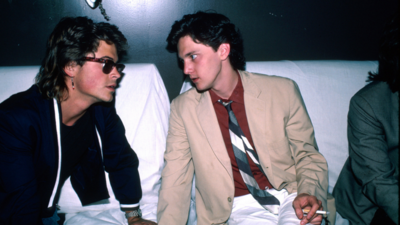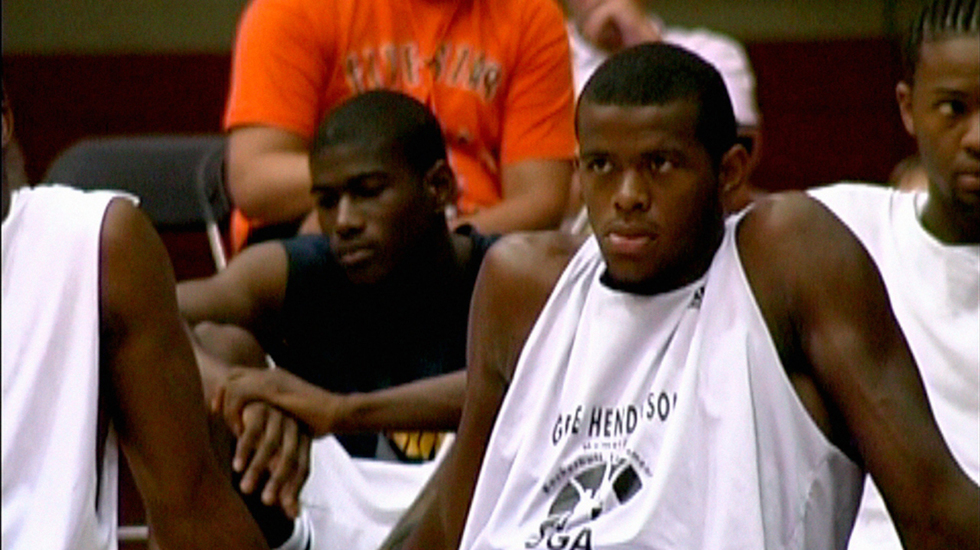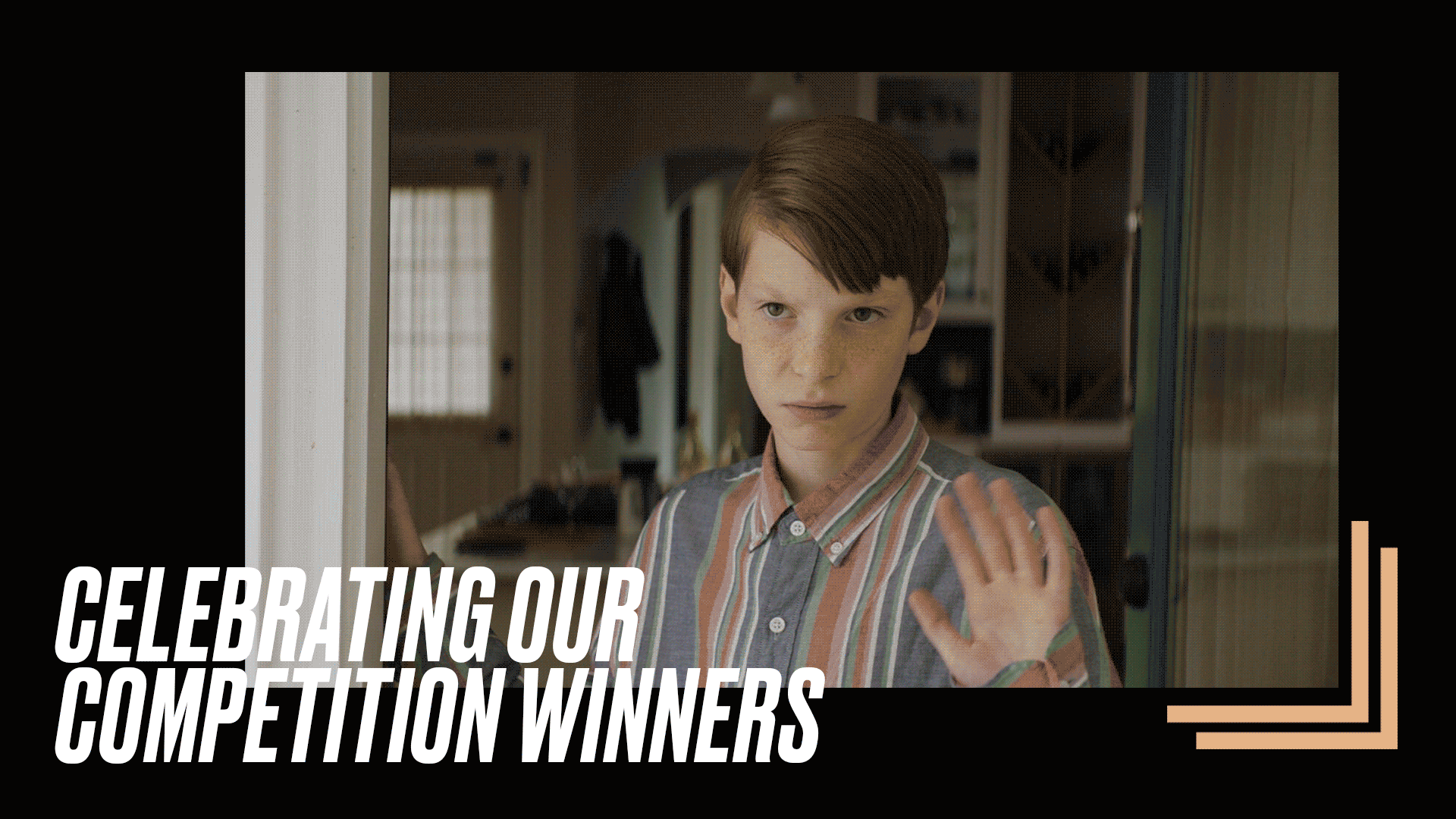
BY KAREN KEMMERLE |
‘Lenny Cooke’ Directors Josh and Benny Safdie Explore What Happened to the American Dream
Lebron James, Carmelo Anthony, Amar’e Stoudemire and Lenny Cooke? One of these names doesn’t quite fit. The famed Safdie Brothers make their feature-length documentary debut with ‘Lenny Cooke,’ a film that delves into the life of a notorious “never-was” in the NBA.

Tribeca: Tell us a little about Lenny Cooke. What inspired you to tell this story?
Josh Safdie: I think the original inspiration for the story was greatness, the idea of understanding the perspective of what it’s like to be the best at one specific thing in life. We wanted to explore what that does to your ego, what that does to the people around you, what that does to your whole perspective – that would be the initial drive.
Our producer, Adam Shopkorn, was making this film while when we were still in high school. He was following Lenny around when he was still in high school. Everyone was saying he had the potential to become the next Michael Jordan or the future of the NBA. However, when you’re an adolescent, you can’t see past your immediate circle.
You think the world revolves around you. Unfortunately, it complicates things when the press and the people around you make you believe that’s the absolute truth. As time passed and Lenny didn’t make it, this idea of being a martyr exploited by basketball and the press becomes part of the American reality. It makes you question the American dream.

Tribeca: In addition to watch Lenny Cooke at his athletic peak in high school, you also got to see the young LeBron James, Carmello Anthony and Amar’e Stoudemire in action.
Benny Safdie: Yeah, and to be completely honest, LeBron James was a big inspiration behind this— you’re a low level Greek God running an island, you’re like a Hermes, and you live your day-to-day life and think “okay, I run this world that’s around me; I can kill all the fish I want; I can create a tidal wave.” Then one day Zeus shows up and catapults you a million miles into the ocean. Your whole world is upside down because you thought you were at the top of the hierarchy. Seeing LeBron James today, we know that he’ll go down in history as one of the greatest athletes of all time. Think about being the greatest and then having this kid making his name against you, and what that means in terms of luck.
JS: Yeah, the fact that we’re able to witness Lenny’s story from his perspective puts you in the position to look at Carmelo Anthony, LeBron James, and others in a way that they have not been seen. You can access their level of work ethic and what they needed to do to succeed. You can only get that through Lenny’s story and perspective.
Tribeca: How many hours of footage did you go through?
JS: About 5 million [laughs]. It’s difficult to say because Adam was filming a long time ago, 10 years ago, and we were filming for 2 years, so it was well over a 100 hours.
If there was any problem we encountered, it was that we inflated his ego.
Tribeca: What was your initial reaction upon meeting Lenny?
JS: All we knew of Lenny initially was from the footage documented from 2001, essentially. When Adam went saw him for the first time after years and years, he didn’t even recognize him. He thought he was his cousin.
Time really did a lot to Lenny. So when we all started to become acquainted with him, we saw that he’s a giant. He’s a huge person, physically, and that has a really interesting effect on your personal relationship. It almost feels like you’ve got the Jolly Green Giant’s attention.
BS: The other thing is, he has really accepted his fate. He knows he’s back where he started, and while he never technically lost anything, he didn’t gain anything either. It’s very hard to rebound from this type of damage. He was lifted so high up, with so many people around him, but after he made poor decisions, he was all by himself.
Tribeca: He had such humble beginnings…
BS: All the extremes in his life are very interesting. He was living in absolute squalor, in what’s considered the boondocks of Bushwick even by people who lived in the Projects. Then he moved to one of the richest areas of New Jersey. He’s a real journeyman who is trying to piece this all together and figure out what he can do now that he can’t play basketball.
Tribeca: As an adult, he is struggling to find his place in society and to secure a job so that he can support his wife and daughter. It’s amazing that he is not more bitter and angry than he is. Do you think that he hopes the film will deter others from following his path?
JS: That’s our goal and I genuinely believe that’s partly his goal too – he doesn’t want to see someone go from the top to the bottom. The NBA is all about stories like this which is the reason that. Since 2006 the NBA has rules preventing kids from making the leap directly from high school to the NBA.They want kids to go to college for at least a year so that they have some experience outside their neighborhoods.

Tribeca: Was making the film a version of therapy for him?
JS: I think that we provided him with purpose. If there was any problem we encountered, it was that we inflated his ego.
BS: He has to look at himself and understand certain things that he normally wouldn’t want to talk about. For example, there are certain scenes where he has to confront his past.
Tribeca: One of the most memorable sequences in the documentary in Lenny’s 30th birthday party when he realizes that 10 years had passed since his almost stardom. I don’t think I’ve ever heard such a melancholy Mario song. Can you talk about the experience of filming that scene?
BS: You’re seeing that from his point of view and that’s beautiful. It’s strange that he is having a quarter-life crisis because he’s already lived the lives of 20 men. He was looking at his 30th birthday as his retirement party. It was an intense night.
It makes you question the American dream.
Tribeca: This is an incredibly intimate documentary because Cooke is so remarkably open as he is being filmed. Have Lenny Cooke and his family members seen the film? What were their reactions?
JS: Lenny has seen it and he invited some of his closest friends to see it. It was a strange experience for him, I’m sure. He saw a slightly rougher cut but he saw the film and the one thing we were able to take away from it was his physical reaction, which was appreciation. He gave us one of the deepest hugs I’ve ever experienced, and not just because he’s physically strong and big.
You have to remember that a lot of people walked away from him when he was no longer on top. I think he was touched that we stuck around, that Adam came back and didn’t ditch him and finished unfinished business.
BS: His whole life story was now compacted into something that he could see. It was an emotional experience for him.
Tribeca: What are you most looking forward to at Tribeca?
JS: Lenny Cooke. He’s coming to the Festival. I’m excited to see Lenny on the red carpet and watching the final cut of the film.
BS: It’ll be like he’s in the spotlight again.
Tribeca: What makes Lenny Cooke a Tribeca must-see?
JS: I’m going to use a Kenny Smith quote that didn’t make the final cut of the film: “In New York, we don’t make coal, we make diamonds.”
Lenny Cooke premieres Thursday, April 18, at the AMC Loews Village 7. For more information and additional showtimes, please visit our Film Guide listing.

